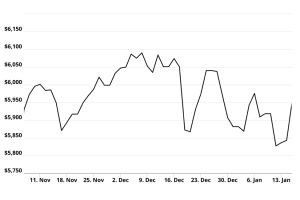
When you think about tech disruptor stocks, it’s hard not to mention Uber Technologies (NYSE:UBER). By making use of the “dead” space found in millions of cars in the U.S. – and increasingly across the world – Uber not only provided a convenient service but also forged an entirely new sharing economy.
That’s really the spirit behind tech disruptor stocks. We’re looking for enterprises that can potentially catapult their offerings into high ground, weeding out competitors and less efficient and effective businesses. Yes, there’s an element here that’s cold. Needless to say, this sector is also incredibly speculative.
Still, the rewards can be phenomenal if the stars align just right. On that note, below are potential tech disruptor stocks to consider.
PROS Holdings (PRO)

Falling under the application software subsegment of the broader tech ecosystem, PROS Holdings (NYSE:PRO) provides software solutions that optimize the processes of selling and shopping in the digital economy in Europe, Asia-Pacific, the Middle East, Africa, and internationally. Per its public profile, the company offers a range of solutions that cover areas such as business optimization and artificial intelligence-based learning algorithms.
Fundamentally, enterprises across industries are looking for an edge to retain and build their customer base. In this fierce environment, PROS just might be able to sell its message to prospective enterprise-level clients. So far, it’s doing a solid job. Aside from a big miss in the fourth quarter last year, PROS has been delivering the goods against bottom-line targets.
For fiscal 2024, experts anticipate earnings per share of 20 cents on top of revenue of $333.66 million. Last year, the print came out to earnings of 5 cents per share on sales of $303.71 million.
Notably, analysts rate PRO a unanimous strong buy with a $41.17 average price target. It’s one of the tech disruptor stocks to consider.
Couchbase (BASE)

Operating under the infrastructure software subcategory, Couchbase (NASDAQ:BASE) provides a cloud database platform for enterprise applications. Per its public profile, Couchbase works in multiple configurations, ranging from cloud to multi- or hybrid-cloud to on-premise environments to the edge. The company offers a variety of solutions, including data synchronization and backend data storage. It also serves multiple industries, including government agencies, e-commerce, and financial services, among others.
In the past 52 weeks, BASE has enjoyed a very strong performance, almost doubling in market value. It has also carried this performance into the financial realm, beating estimates for bottom-line targets. While it’s not profitable, Couchbase has been paring down expected losses per share. In the past four quarters, the average positive surprise came out to 37.75%.
For the current fiscal year (2025), experts anticipate a loss of 44 cents per share on revenue of $205.53 million. That compares favorably to a loss of 57 cents on sales of $180 million.
Analysts peg shares as a moderate buy with a $32.91 price target. Again, it’s a solid idea for tech disruptor stocks.
Applied Optoelectronics (AAOI)

Listed under the communication equipment subsector, Applied Optoelectronics (NASDAQ:AAOI) designs, manufactures and sells fiber-optic networking products in the U.S., Taiwan and China. It offers optical modules, optical filters, lasers, laser components, subassemblies, transmitters and transceivers, turn-key equipment, headend, node, distribution equipment and amplifiers. Mainly, Applied sells its products to internet data center operators, along with cable television networks and telecom equipment manufacturers.
As with other small-capitalization firms, Applied doesn’t have the most consistent financial performance. For example, it posted a bad miss in Q1 last year. Still, it’s been improving its form. In the most recent Q4 disclosure, the tech firm posted EPS of 4 cents against an expected break-even quarter.
For fiscal 2024, analysts anticipate that the company will post a loss of 9 cents per share on revenue of $287.93 million. Both stats represent a massive improvement over last year’s print of a loss of 42 cents on sales of $217.65 million. Further, 2025 sales could land at over $432 million.
AAOI enjoys a moderate buy consensus view with an $18 price target. For speculators, it could be one of the tech disruptor stocks.
ACM Research (ACMR)

Working under the semiconductor equipment and materials label, ACM Research (NASDAQ:ACMR), along with its subsidiaries, develops, manufactures, and sells single-wafer wet cleaning equipment to enhance the manufacturing process and yield for integrated chips worldwide. Per its corporate profile, ACM offers myriad advanced solutions, including alternated phase shift technology for flat and patterned wafer surfaces.
While it doesn’t get much attention, the wafer cleaning equipment market size reached a valuation of $10.1 billion last year. Experts believe that the segment could rise to $20.18 billion by 2030, representing a compound annual growth rate of 10.4%. These figures seem realistic considering ACM’s incredible earnings performances. In the past three quarters, its average positive earnings surprise stood at 173.5%.
For fiscal 2024, analysts anticipate EPS to reach $1.46 on sales of $701.7 million. While the bottom line may fall short of last year’s print of $1.63, the top line may see growth of 25.8%.
Notably, ACMR enjoys a unanimous strong buy consensus view with a $37.75 average price target. It’s a hidden gem among tech disruptor stocks.
SkyWater Technology (SKYT)
Falling under the semiconductor category, SkyWater Technology (NASDAQ:SKYT) operates as a pure-play technology foundry. It engages in the provision of semiconductor development, manufacturing and packaging services. Fundamentally, SKYT could rank among the tech disruptor stocks by offering a viable alternative semiconductor supply chain. Per its corporate profile, SkyWater offers myriad advanced solutions, including silicon-based analog and mixed-signal and micro-electromechanical systems.
Further bolstering its relevancy, SkyWater serves customers in the computation, aerospace and defense, automotive, bio-health, consumer and industrial sectors. Intriguingly, aside from a bum note in Q2 last year, the company has pared down expected losses per share. Even with the poor Q2 result, over the past four quarters, the average positive surprise came out to 46.2%.
For fiscal 2024, analysts believe SkyWater will post EPS of 7 cents on revenue of $330.73 million. These figures represent an improvement over last year’s print of a loss of 17 cents on sales of $286.68 million.
Another tempting note: analysts rate shares a unanimous strong buy with a $15 price target.
Synchronoss Technologies (SNCR)

Operating under the infrastructure software segment, Synchronoss Technologies (NASDAQ:SNCR) provides cloud, messaging, digital and network management solutions in the Americas, Europe, the Middle East, Africa and Asia-Pacific. Syncronoss offers its cloud platform that allows customers’ subscribers to backup and protect, engage with and manage their personal content. SNCR may be one of the tech disruptor stocks for its communications management, especially in an era of data privacy concerns.
While Synchronoss presents an enticing narrative, it’s financials have been all over the map. For example, in Q1 and Q4 last year, the average negative surprise came out to 525%. However, in Q3, the company posted EPS of 45 cents, handily beating the consensus estimate of a loss of 4 cents.
For fiscal 2024, experts believe that the company will post a loss of $1.66 on revenue of $171.57 million. Last year, the company posted a loss of $1.41 on revenue of $164.2 million. Interestingly, fiscal 2025 sales could potentially hit $181.49 million.
Northland Securities pegs SNCR a “buy” with a lofty $20 price target.
Aeva Technologies (AEVA)

Another infrastructure software play, Aeva Technologies (NYSE:AEVA) is a high-risk, high-reward proposal among tech disruptor stocks. Per its corporate profile, Aeva engages in the design, manufacturing, and sale of lidar (light detection and ranging) sensing systems, and related perception and autonomy-enabling software solutions. It offers a unique 4D lidar sensing system with embedded software for automated driving and industrial automation, among other functionalities.
It could easily be disruptive because no company has quite figured out the autonomy code just yet. Further, Aeva’s 4D lidar system is incredibly compelling because it can calculate obstacle trajectories based on their present velocity. It’s groundbreaking stuff. However, if there is a drawback, it’s that so far, the narrative has been focused on the science, not the financials.
However, that could change soon. For fiscal 2024, experts believe Aeva could post sales of $8.79 million. While that’s not much, It’s almost 104% higher than last year’s print of $4.31 million. And fiscal 2025 revenue could hit $37.08 million.
Analysts rate shares a moderate buy with a whopping $15.05 average price target.
On the date of publication, Josh Enomoto did not have (either directly or indirectly) any positions in the securities mentioned in this article. The opinions expressed in this article are those of the writer, subject to the InvestorPlace.com Publishing Guidelines.




